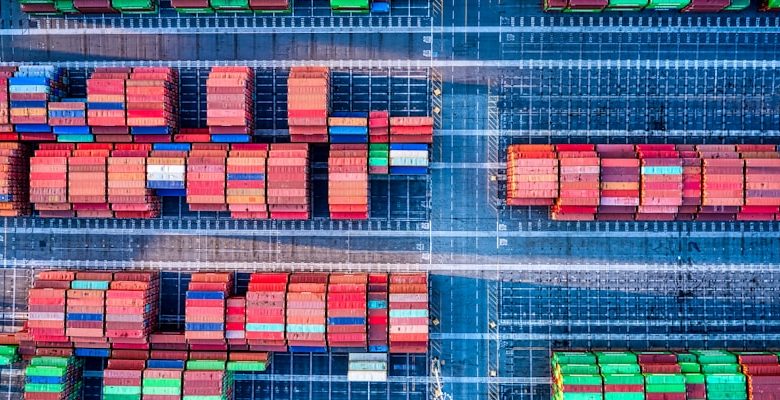How Blockchain Is Improving Supply Chain Transparency

- Understanding the Role of Blockchain in Supply Chain Management
- The Benefits of Utilizing Blockchain Technology in Enhancing Transparency
- Real-life Examples of Companies Using Blockchain for Supply Chain Transparency
- Challenges and Opportunities of Implementing Blockchain in Supply Chains
- Exploring the Future Potential of Blockchain in Supply Chain Operations
- Key Considerations for Businesses Looking to Adopt Blockchain for Transparency
Understanding the Role of Blockchain in Supply Chain Management
Blockchain technology is revolutionizing the way supply chain management operates by providing a transparent and secure platform for tracking transactions and goods throughout the entire supply chain. This technology enables all parties involved in the supply chain to have real-time access to information, which helps improve efficiency and reduce the risk of fraud or errors.
One of the key benefits of blockchain in supply chain management is its ability to create an immutable record of transactions. This means that once a transaction is recorded on the blockchain, it cannot be altered or deleted, providing a high level of security and transparency. By utilizing blockchain, companies can ensure that the data they are sharing with their partners is accurate and trustworthy.
Furthermore, blockchain technology allows for greater traceability of products, enabling companies to track the movement of goods from the point of origin to the final destination. This level of transparency helps to build trust among consumers who are increasingly interested in knowing where their products come from and how they are produced.
In addition to improving transparency and traceability, blockchain also has the potential to streamline supply chain processes by automating tasks such as inventory management, payments, and compliance checks. By removing the need for manual intervention, companies can reduce costs and improve the overall efficiency of their supply chain operations.
Overall, blockchain technology is playing a crucial role in transforming supply chain management by enhancing transparency, security, and efficiency. As companies continue to adopt this innovative technology, we can expect to see significant improvements in supply chain operations and a greater level of trust among all parties involved.
The Benefits of Utilizing Blockchain Technology in Enhancing Transparency
Utilizing blockchain technology in supply chains brings numerous benefits, with enhanced transparency being a key advantage. By leveraging blockchain, companies can create a decentralized and immutable ledger that tracks every transaction and movement of goods along the supply chain. This level of transparency allows for real-time visibility into the flow of products, enabling stakeholders to identify inefficiencies, fraud, or errors quickly.
Moreover, blockchain technology ensures that all participants in the supply chain have access to the same information, reducing the risk of discrepancies or disputes. This transparent and shared ledger promotes trust among partners, leading to better collaboration and smoother operations. With increased transparency, companies can also meet regulatory requirements more easily, as they can provide accurate and auditable records of their supply chain activities.
Another benefit of utilizing blockchain for transparency is the ability to track the provenance of products. By recording every step of a product’s journey on the blockchain, companies can verify the authenticity and origin of goods, helping to combat counterfeiting and ensure quality control. This level of transparency is particularly valuable for industries like food and pharmaceuticals, where traceability is crucial for consumer safety.
Real-life Examples of Companies Using Blockchain for Supply Chain Transparency
Blockchain technology has been increasingly adopted by companies looking to improve supply chain transparency. Many organizations across various industries have integrated blockchain into their operations to enhance visibility and traceability in their supply chains. Here are some real-life examples of companies leveraging blockchain for improved supply chain transparency:
- Walmart: The retail giant has implemented blockchain technology to track the movement of food products from farm to store shelves. By using blockchain, Walmart can quickly trace the origin of contaminated food products, reducing the time it takes to identify the source of outbreaks and prevent further distribution.
- IBM: IBM has developed a blockchain platform called Food Trust, which enables food suppliers, distributors, and retailers to share data on a transparent and immutable ledger. This helps in verifying the authenticity of food products and ensuring compliance with regulations throughout the supply chain.
- Maersk: The shipping company Maersk has collaborated with IBM to create TradeLens, a blockchain-based platform for digitizing global trade processes. By using blockchain technology, Maersk can streamline documentation processes, reduce paperwork, and improve visibility into the movement of goods across international borders.
- Nestle: Nestle has partnered with OpenSC, a blockchain platform that allows consumers to track the journey of their food products from farm to fork. By scanning a QR code on the product packaging, consumers can access information about the origins of the ingredients used in the product, fostering trust and transparency in the supply chain.
These examples demonstrate how blockchain technology is revolutionizing supply chain management by providing a secure and transparent way to track the flow of goods and information across complex networks. By leveraging blockchain, companies can enhance trust among stakeholders, improve efficiency, and mitigate risks in their supply chains.
Challenges and Opportunities of Implementing Blockchain in Supply Chains
Implementing blockchain in supply chains presents both challenges and opportunities for businesses looking to improve transparency and efficiency in their operations. One of the main challenges is the initial investment required to set up the blockchain infrastructure and integrate it with existing systems. This can be a significant barrier for smaller companies with limited resources. However, the long-term benefits of increased transparency and reduced fraud risk can outweigh the upfront costs.
Another challenge is the need for collaboration among different parties in the supply chain to adopt blockchain technology. This requires a level of trust and cooperation that may not always be present, especially in industries with competing interests. Overcoming this barrier will be crucial for the widespread adoption of blockchain in supply chains.
Despite these challenges, there are numerous opportunities for businesses that successfully implement blockchain technology in their supply chains. One of the main advantages is the ability to track products in real-time, from the source to the end consumer. This level of transparency can help companies identify and address issues such as counterfeit products or supply chain delays more effectively.
Blockchain also has the potential to streamline processes and reduce paperwork in supply chains, leading to cost savings and increased efficiency. Smart contracts, which are self-executing contracts with the terms of the agreement written into code, can automate many aspects of supply chain management, from payments to quality control.
Overall, while there are challenges to overcome, the opportunities presented by blockchain technology in improving supply chain transparency are vast. Businesses that are able to navigate these challenges and implement blockchain successfully stand to benefit from increased trust, efficiency, and cost savings in their supply chain operations.
Exploring the Future Potential of Blockchain in Supply Chain Operations
One of the most promising areas where blockchain technology is making a significant impact is in supply chain operations. By leveraging blockchain, companies can enhance transparency and traceability throughout the supply chain, ultimately leading to improved efficiency and reduced costs.
Blockchain allows for the creation of a decentralized and immutable ledger that records transactions in a secure and transparent manner. This means that every step in the supply chain, from raw material sourcing to delivery of the final product, can be tracked and verified in real-time.
One of the key advantages of blockchain in supply chain operations is its ability to verify the authenticity of products. By recording every transaction on the blockchain, companies can ensure that products are not counterfeit or tampered with, thereby increasing trust and credibility among consumers.
Furthermore, blockchain can streamline the process of verifying the origin of products. With blockchain, companies can easily trace the journey of a product from its point of origin to its final destination, providing valuable insights into its quality and authenticity.
Overall, the future potential of blockchain in supply chain operations is vast. As more companies adopt this technology, we can expect to see increased transparency, efficiency, and trust in supply chains around the world. By embracing blockchain, companies can stay ahead of the curve and revolutionize the way they manage their supply chain operations.
Key Considerations for Businesses Looking to Adopt Blockchain for Transparency
When businesses consider adopting blockchain technology for enhancing supply chain transparency, there are several key considerations they should keep in mind to ensure a successful implementation:
- 1. **Data Security:** One of the main benefits of blockchain is its ability to secure data through cryptographic techniques. Businesses should prioritize data security to protect sensitive information from unauthorized access.
- 2. **Scalability:** Before implementing blockchain, businesses need to assess whether the technology can scale to meet the demands of their supply chain operations. It is essential to ensure that the blockchain network can handle the volume of transactions efficiently.
- 3. **Interoperability:** Businesses should consider the interoperability of blockchain with existing systems and technologies. It is crucial to integrate blockchain seamlessly with other platforms to ensure smooth data flow across the supply chain.
- 4. **Transparency:** Blockchain enables transparent and immutable record-keeping, but businesses need to establish clear guidelines for sharing information on the network. Transparency should be balanced with data privacy and confidentiality concerns.
- 5. **Compliance:** Businesses must comply with regulatory requirements when implementing blockchain for supply chain transparency. It is essential to ensure that the technology meets legal standards and industry regulations.
By addressing these key considerations, businesses can leverage blockchain technology to enhance transparency in their supply chain operations effectively.



